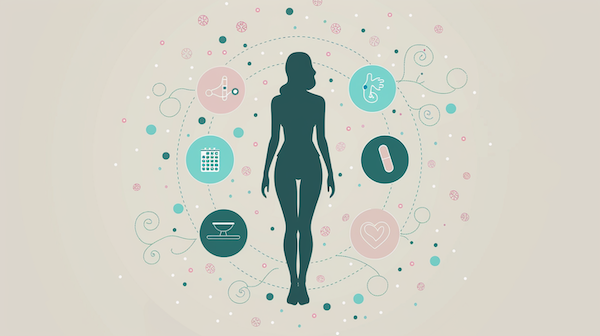Understanding PCOS-Related Facial Hair Growth
Dealing with unwanted facial hair due to PCOS can be challenging. This excess hair growth, known as hirsutism, occurs because of higher levels of androgens (male hormones) in your body. While it may feel overwhelming, there are several ways to manage this symptom through diet and lifestyle changes.
The Role of Nutrition in Managing Facial Hair
What you eat can significantly impact your hormone levels. A diet rich in anti-inflammatory foods and those that support hormone balance can help manage facial hair growth. Green leafy vegetables are particularly beneficial as they contain compounds that may help regulate hormone levels.
Key Foods That May Help
Certain foods can support your body's hormone balance:
- Foods rich in zinc and omega-3 fatty acids, like seaweed, can help regulate hormone production
- Anti-inflammatory foods may help reduce androgen levels
- Immune-supporting foods can help your body maintain overall hormone balance
Lifestyle Changes That Make a Difference
Beyond diet, certain lifestyle modifications can help manage facial hair growth:
- Regular exercise helps improve insulin sensitivity
- Stress management techniques can help balance hormones
- Adequate sleep supports hormone regulation
Natural Approaches to Hair Management
While working on internal balance through diet and lifestyle, you can also try natural approaches to manage facial hair:
- Regular skin care routines
- Natural hair growth inhibitors
- Professional hair removal methods
Supporting Your Hormone Balance
Focus on foods that support hormone balance. Try incorporating hormone-balancing beverages and foods that promote hair health into your diet.
Creating a Sustainable Routine
Managing facial hair requires patience and consistency. Focus on creating sustainable habits that you can maintain long-term. Consider trying hormone-balancing smoothies as part of your daily routine.
Extra Tip
Try keeping a symptom diary alongside your food journal to track how dietary changes affect your facial hair growth patterns over time.
How This Article Was Made
This article was created using evidence-based research from:
- National Institutes of Health (NIH) studies on PCOS and hirsutism
- Endocrine Society clinical practice guidelines
- Peer-reviewed journals focusing on endocrinology and women's health
- Medical databases including PubMed and MEDLINE

Community Comments
Community Comments
Add a comment